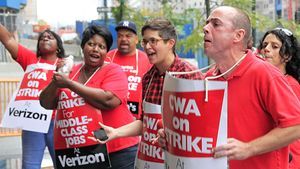More Than 45,000 Verizon Union Workers Hit Picket Line
At midnight Saturday, about 45,000 Verizon Communications union-represented wireline employees in the Northeast and Mid-Atlantic regions walked off the job after the telco and the unions failed to agree on terms for a new contract, with health-care premiums a key point of contention.
The 45,000-plus workers, represented by the Communications Workers of America and the International Brotherhood of Electrical Workers, had been bargaining with Verizon since June 22.
Verizon, among other things, is seeking to have union workers contribute toward their health-care plans; under previous agreements, CWA and IBEW employees pay no monthly premiums. The telco also wants "work rule" flexibility, which would let call-center representatives handle certain types of calls without needing to transfer customers to other centers as currently required in some situations under the previous union contracts.

According to the unions, Verizon has refused to budge from "a long list of concession demands" with almost 100 concessionary company proposals still on the table as the contract expired Saturday.
Talks between Verizon and the unions continued Monday in New York, at an undisclosed location. "We're willing to meet, and we're willing to talk," Verizon spokesman Rich Young said. "We need to update our health-care plans for our associated workforce."
According to the CWA, Verizon canceled scheduled bargaining sessions on Saturday night as well as Sunday morning and afternoon.
In a statement released Sunday, IBEW International president Edwin Hill said, "If Verizon had shown any good-faith effort to negotiate honestly, our members would still be on the job. Instead, they turned their backs on any attempts to reach a reasonable settlement. We cannot stand by while one of the richest, most successful corporations in the world joins the race to decimate the middle class of this country. We remain ready to meet with Verizon to work out a fair agreement, but at this point, we had no choice."
Multichannel Newsletter
The smarter way to stay on top of the multichannel video marketplace. Sign up below.
Verizon said it had activated a contingency plan to operational continuity, under which it "tens of thousands" of management employees, retirees and others will take over roles and responsibilities of the striking union wireline workers.
"We are confident that we have the talent and resources in place to meet the needs and demands of our customers," Verizon executive vice president of human resources Marc Reed said in a statement Sunday.
Reed continued, "We will continue to do our part to reach a new contract that reflects today's economic realities in our wireline business and addresses the needs of all parties. It's also our intent that under a new contract, Verizon employees will continue to receive competitive pay and benefit programs."
According to Jefferies & Co. managing director of communications equipment equity research George Notter, strikes in the telecom industry historically have been resolved quickly. That implies that the effect on Verizon's wireline equipment vendors -- which include Adtran, Alcatel-Lucent, Broadsoft, Ciena, Juniper Networks and Tellabs -- will be minimal, he wrote in a note Monday.
"[T]hese situations tend to get resolved successfully within a short period of time," Notter wrote.
However, Notter added, given that Verizon's wireline business accounts for approximately 14% of North American capital expenditures in the segment, "a prolonged strike could materially impact certain equipment vendors."
Of the 45,000 wireline employees on strike, the CWA represents about 33,000 and the IBEW covers about 12,000 workers.
The employees work in Washington, D.C., and Northeast and Mid-Atlantic states including Massachusetts, Rhode Island, New York, New Jersey, Pennsylvania, Delaware, Maryland, Virginia and West Virginia. About 13,000 other union members work for Verizon in other areas of the country but their contracts expire at various other dates and are not involved in the current standoff.
The unions, trying to bolster their case that Verizon is not hurting for cash, pointed out that the company's 2011 annualized revenue is approximately $108 billion and annualized net profit is $6 billion. Furthermore, Verizon Wireless just paid a $10 billion dividend to its owners, parent company Verizon Communications and Vodafone.
Verizon's position is that union-represented employees should shoulder their share of rising health care costs. The telco said it spends $4 billion on health care annually covering 800,000 employees, retirees and their families.
"Today, more than 135,000 non-union Verizon employees make health-care contributions. Verizon is proposing that its union-represented employees contribute toward the cost of rising health-care expenses," the company said in a statement on its website.
Newly appointed Verizon CEO Lowell McAdam, in a letter to Verizon managers the company posted online, said the telco has "arrived at the point where we must make additional hard decisions to address customer needs and the overall operating costs of the business."
"It's no secret that the Wireline business has experienced a ten-year decline in our customer base and in profitability, despite investing billions in improving our network, processes and systems," McAdam wrote. "We have taken many steps to offset this decline, including reducing our workforce, increasing the amount our management employees contribute to their benefits, and even selling some of our Wireline properties."
Verizon most recently had a labor dispute with the CWA and IBEW in August 2008, although the unions did not go on strike while they negotiated new three-year contracts with the telco.
